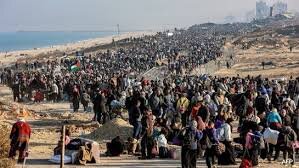Palestinians begin returning to northern Gaza, resistance bears fruit

After 15 months of genocide, hundreds of thousands of Palestinians are returning to northern Gaza as part of a ceasefire deal between Israel and Hamas.
Early on Monday, the Palestinians – huddled together, holding their belongings in sacks and plastic bags – began heading northwards on foot through the so-called Netzarim Corridor, Al Jazeera reported.
“I will start rebuilding my home – brick by brick, wall by wall,” a forcibly displaced Palestinian told Al Jazeera. “We will start by removing the debris and rebuild it all over again.”
The people returning to Gaza on foot as the U.S. and Qatar helped preserve two ceasefire agreements — between Hamas in Gaza and Hezbollah in Lebanon — that both risked collapse over the weekend.
Al Jazeera reporter from Gaza said there was a “sense of excitement and happiness picking up”.
“We saw a change in the mood of everyone. We have never seen people that happy in the past 15 months,” the reporter said.
“People describe this moment as historic. They say it’s as important as the announcement of a ceasefire. For them, this is a victorious day.”
Hamas called the return “a victory” for Palestinians and its ally the Palestinian Islamic Jihad said it was a “response to all those who dream of displacing our people”.
In Gaza, a dispute over Hamas' return of a specific hostage had led to the Israeli military blocking the return of Palestinian residents to the north of Gaza.
In a statement, Hamas said Palestinians returning to areas from which they were forcibly displaced confirm their link to their land and once again “prove the failure of the occupation to achieve the aggressive goals of displacing people and breaking their steadfast will”.
In the early days of the war, Israel had forcibly evacuated some 1.1 million people from north Gaza to prepare for a ground invasion.
In Lebanon, the Israeli military had fired on citizens who had sought to return to villages in the south of the country, from where Israeli forces were supposed to have evacuated by Sunday.
The disagreements between Israel and resistance groups it has fought for decades highlighted the low levels of trust between the recently warring parties. But last-ditch negotiations involving officials in the Qatari capital Doha, Washington D.C., and elsewhere have managed to keep the ceasefire deals alive, according to President Trump's special envoy to the Middle East, Steve Witkoff, NPR reported.
"There was a crisis," said Witkoff in comments to reporters in New York Sunday night, "and we managed to overcome it with good dialogue and conversation. This is a sign that we all need to stay positive." He praised Qatar's prime minister as well as the Israeli government for helping resolve the respective disputes.
Over the weekend, Israeli leaders had made the return of displaced Palestinians to northern Gaza contingent on the immediate release of an Israeli female civilian, Arbel Yehud, arguing that the ceasefire agreement had stipulated that civilian women should be returned before female soldiers — four of whom were released Saturday.
The resolution came after Qatar announced it had helped broker the compromise, and the Qatari foreign ministry, which had helped mediate the overarching ceasefire agreed two weeks ago, said Hamas would hand over three hostages before Friday.
According to a statement from the Israeli Prime Minister's Office, three hostages held by Hamas since Oct. 7, 2023, will now be released Thursday — slightly ahead of the previously agreed-upon release day for a further three hostages.
They will include Yehud, a civilian who had become the center of dispute this weekend after Hamas officials had insisted she was in fact an Israeli soldier and so would not be prioritized for release with other civilian women and children. Also slated for release Thursday is Agam Berger, a female soldier. The identity of the third hostage to be released was not made public.
A Qatari foreign ministry statement said Hamas would also provide information on the condition of the remaining 26 Israeli hostages to be released in the first six-week phase of the deal.
Meanwhile in southern Lebanon, a 60-day ceasefire agreement that the U.S. helped broker in November, which temporarily ended fighting between the Israeli military and the Lebanese Hezbollah resistance group, had expired on Sunday.
Israeli troops had opened fire Sunday on people who tried to get past them to remote villages in southern Lebanon that the Israeli troops had not yet evacuated. Lebanon's health ministry said 22 people were killed and 124 injured during the shooting.
Leave a Comment